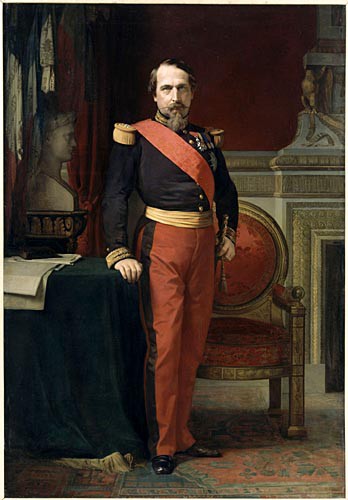
To be frank no actual personal was identified to be the first napoleon.So we take it from here.
Prince Louis Napoleon was forty when he won the election for the French Presidency in 1848, a small, reserved, enigmatic man with chestnut hair, brown beard and a pointed moustache. Polling well over 5 million votes, he won one of the most remarkable victories in French history, though he had never held public office or distinguished himself in any worthwhile capacity. The nostalgic vote which carried him to power looked back to the greatness of France under his uncle, Napoleon I, whose name he carried and whose heir he claimed to be.
Charles Louis Napoleon Bonaparte, born in Paris in 1808, was both the nephew of Napoleon I and the grandson of the Empress Josephine. His father, who was king of Holland at the time (and who had doubts about whether the boy was really his), was Napoleon I's brother Louis. His mother was Hortense de Beauharnais, Josephine's daughter by her first husband.
Louis Napoleon last saw the first Napoleon as a boy of seven and grew up in exile in Switzerland and Germany, imbibing from his mother a profound admiration for his uncle's genius and a romantic longing for France, his lost homeland. The death in Vienna in 1832, at the age of twenty-one, of Napoleon I's only son, the Duke of Reichstadt, allowed Louis Napoleon to regard himself as the true Bonaparte heir and he made vain attempts to bring off coups in France in 1836 and in 1840.
Louis-Napoléon’s childhood and youth were spent largely in exile. His mother, like all the Bonapartes, was banished from France in 1815 after the fall of Napoleon I. Eventually, she found a new home in Switzerland, where, in 1817, she bought the castle of Arenenberg. Of romantic disposition herself, she inspired young Louis-Napoléon with a longing for his lost fatherland, as well as with enthusiastic admiration of the genius of Napoleon I. After attending a grammar school at Augsburg, Ger. (1821–23), her “sweet stubborn boy” was taught by private tutors.
How did Napoleon came to power?
Napoleon came into power in France due to military success in Italy, as well as his attack on the French Revolutionary government while it was under assault by a Parisian mob. On November 9th and 10th, 1799, he was put into power with two other consuls, Sieyes and Ducos.
Claim to the throne
After
the death in 1832 of his cousin the Duke of Reichstadt (Napoleon I’s
only son), Louis-Napoléon considered himself his family’s claimant to
the French throne. To be better prepared for his task, he completed his
military training and pursued his studies of economic and social
problems. Soon after, he felt ready to publish his own writings on
political and military subjects. In his pamphlet “Rêveries politiques”
(1832), he asserted that only an emperor could give France both glory
and liberty. He thus wanted to make his name known, propagate
his ideas, and recruit adherents. Convinced that as Napoleon’s nephew
he would be popular with the French army, he vainly tried, on Oct. 30,
1836, to win over the Strasbourg garrison for a coup d’état. King Louis-Philippe exiled him to the United States, from which he was recalled early in 1837 by his mother’s last illness. Expelled from Switzerland in 1838, he settled in England.
In his pamphlet “Rêveries politiques”
(1832), he asserted that only an emperor could give France both glory
and liberty. He thus wanted to make his name known, propagate
his ideas, and recruit adherents. Convinced that as Napoleon’s nephew
he would be popular with the French army, he vainly tried, on Oct. 30,
1836, to win over the Strasbourg garrison for a coup d’état. King Louis-Philippe exiled him to the United States, from which he was recalled early in 1837 by his mother’s last illness. Expelled from Switzerland in 1838, he settled in England.
 In his pamphlet “Rêveries politiques”
(1832), he asserted that only an emperor could give France both glory
and liberty. He thus wanted to make his name known, propagate
his ideas, and recruit adherents. Convinced that as Napoleon’s nephew
he would be popular with the French army, he vainly tried, on Oct. 30,
1836, to win over the Strasbourg garrison for a coup d’état. King Louis-Philippe exiled him to the United States, from which he was recalled early in 1837 by his mother’s last illness. Expelled from Switzerland in 1838, he settled in England.
In his pamphlet “Rêveries politiques”
(1832), he asserted that only an emperor could give France both glory
and liberty. He thus wanted to make his name known, propagate
his ideas, and recruit adherents. Convinced that as Napoleon’s nephew
he would be popular with the French army, he vainly tried, on Oct. 30,
1836, to win over the Strasbourg garrison for a coup d’état. King Louis-Philippe exiled him to the United States, from which he was recalled early in 1837 by his mother’s last illness. Expelled from Switzerland in 1838, he settled in England.